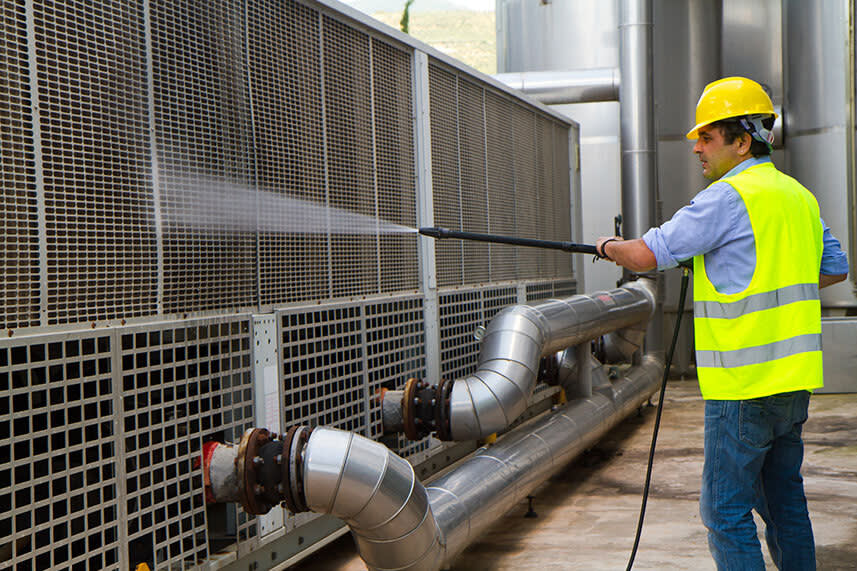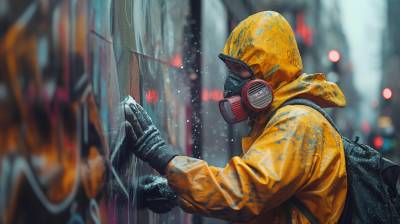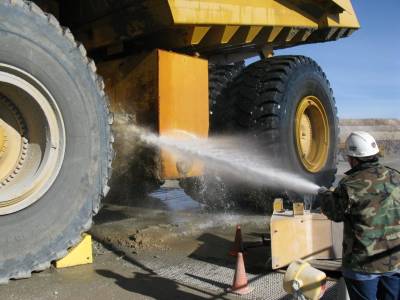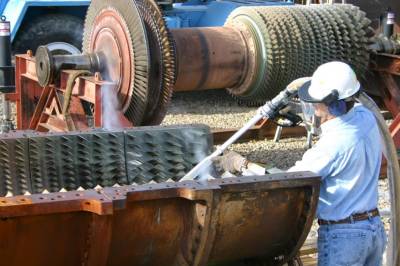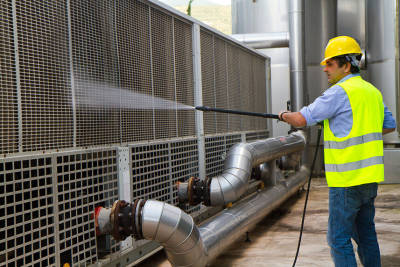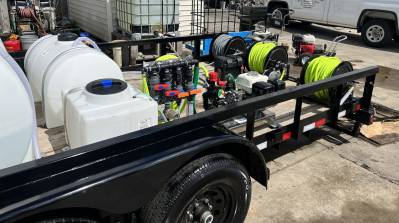In every industry, cleanliness and sanitization play a crucial role in maintaining the efficiency and longevity of the machinery. This is especially true when it comes to industrial equipment cleaning, which is an integral part of industrial maintenance strategy. High-standard cleanliness ensures smooth operation, boosts productivity, and helps avoid any unexpected malfunctions or breakdowns. But, what exactly does industrial equipment cleaning entail? What are the best methods for industrial equipment cleaning? Let's delve deeper into these questions.
Understanding Industrial Equipment Cleaning
Industrial equipment cleaning refers to the practice of keeping industrial machinery free from dirt, grime, grease, and any other form of contamination. It's not just about aesthetical appeal but is also about maintaining the functionality of the equipment.
The process often involves specialized machinery, industry-specific cleaning agents, and trained professionals who know how to carry out the task without causing any damage to the machines.
Importance of Industrial Equipment Cleaning
Cleaning industrial equipment might seem like a simple task, but its relevance and implications go far beyond a clean appearance. Here are some reasons why industrial equipment cleaning is crucial:
- Safety: Machinery that isn’t properly cleaned can pose a safety threat. Debris build-up can cause malfunctions, which can result in workplace accidents.
- Performance: Regular cleaning can greatly improve a machine’s performance. When equipment is free from dirt and grime build-up, it runs more efficiently and its lifespan is extended.
- Prevent Downtime: Regular cleaning can identify potential issues before they cause serious damage, resulting in reduced machine downtime.
Methods of Industrial Equipment Cleaning
Now that we understand the importance of industrial equipment cleaning, it's essential to understand the techniques used. The cleaning method entirely depends on the type of industry, the specific equipment, and the kind of dirt or grime present. Some popular methods include:
Pressure Washing
Pressure washing is one of the most popular methods for industrial equipment. It involves using high - pressure water to remove the stubborn muck and grime accumulated over time. It's efficient, eco-friendly, and very effective.
Chemical Cleaning
Chemical cleaning uses specific chemicals or solutions to remove the dirt and grime from industrial equipment. This method is suitable for machinery with stubborn or specific types of dirt that aren't easy to remove with regular cleaning methods.
Cryogenic Cleaning
This method involves using dry ice pellets that sublimate on impact with the surface, lifting and removing the dirt and grime. It's a non-abrasive, non-flammable, and non-conductive cleaning method, making it ideal for various industrial environments.
Choosing the Right Industrial Equipment Cleaning Services
With a range of cleaning methods and companies out there, it can be overwhelming to select the right industrial equipment cleaning service. Here are a few pointers that could assist you:
- Experience and Expertise: Look for industrial cleaning companies with a proven track record in handling equipment similar to yours.
- Customized Plans: The company should be willing to offer customized cleaning plans catering to your specific industry requirements.
- Quality Assurance: Ensure the company follows strict quality assurance protocols and adheres to the industry cleaning standards.
- Safety Measures: The cleaning company should prioritize the safety of the workplace and its employees and use risk-free cleaning methods.
The more efficient your machinery, the more productive your operations will be. So, don’t take short cuts when it comes to industrial equipment cleaning. The longer your equipment runs without major issues, the more profitable your business will be in the long run.
Frequently Asked Questions on Industrial Equipment Cleaning
Can I clean my industrial equipment in-house?
Yes, in-house cleaning of industrial equipment is possible. However, it requires appropriate knowledge of the equipment, cleaning agents, methods, and safety protocols. A dedicated, trained team is needed for effective in-house equipment cleaning. However, many businesses find it more beneficial and efficient to hire professional cleaning services as they possess the necessary expertise, experience, and equipment to clean industrial equipment.
What types of industrial equipment need regular cleaning?
Almost all types of industrial equipment need regular cleaning. These include, but not limited to, manufacturing machinery, processing equipment, HVAC systems, electrical equipment, kitchen appliances in food facilities, chemical storage units, and heavy duty vehicles. Each of these require different cleaning techniques, methods and agents.
Are there specific regulations for industrial equipment cleaning?
Yes, there are specific regulations for industrial equipment cleaning. These include certain OSHA guidelines, EPA regulations, food industry standards, pharmaceutical cleanliness standards, and more, depending on the industry. Companies need to adhere to these standards not only to avoid legal penalties but also to ensure the safety and health of their workers and environment.
What are some common techniques used in industrial equipment cleaning?
Common techniques used in industrial equipment cleaning include pressure washing, steam cleaning, sandblasting, ultrasonic cleaning, foaming, chemical cleaning, and more. The choice of technique depends on various factors like the type of equipment, the kind of dirt or residue, and the material the equipment is made from. Each technique has its own benefits and potential drawbacks, and often a combination of methods is used for comprehensive cleaning.
What safety measures should be taken during industrial equipment cleaning?
Industrial equipment cleaning requires certain safety measures to protect both the equipment and the cleaning personnel. These include, but are not limited to, using appropriate personal protective equipment (PPE), ensuring electrical equipment is properly shut down before cleaning, using the right cleaning agents and equipment, and properly training cleaning crew on safety protocols and emergency procedures.
How often should I clean my industrial equipment?
The frequency of industrial equipment cleaning can vary depending on the type of equipment, its usage, and industry standards. Some equipment may need cleaning daily, while others may only need cleaning on a weekly, monthly, or yearly basis. Regular inspections can help determine the right cleaning schedule for each piece of equipment.
What should I look for when hiring a professional industrial equipment cleaning service?
When hiring a professional industrial equipment cleaning service, some things to consider are their specialty, experience, compliance with safety standards, use of environmentally friendly cleaning methods, and responsiveness to emergencies. Additionally, look for a service with good customer reviews and credible references.
Does industrial cleaning equipment need specific storage or maintenance?
Yes, industrial cleaning equipment usually requires specific storage and maintenance protocols to ensure its longevity and effectiveness. These protocols may involve regular inspection, cleaning, and prevention of deterioration caused by elements such as water, heat or certain chemicals.
Pros and Cons of Industrial Equipment Cleaning
Pros of Industrial Equipment Cleaning
Enhanced Equipment Efficiency
Regular industrial equipment cleaning works to efficiently remove dirt, grime, and debris that tend to accumulate over time. This accumulation can slow down machines and reduce their optimal functioning. Thus, routine cleaning:
- Boosts the equipment's performance by ensuring its hitherto-hidden parts function well.
- Consequently increases productivity as the machines can operate at their topmost speed and efficiency.
Extended Equipment Lifespan
Dirt and grime build-up can greatly incur wear and tear on the industrial machines leading to a reduced lifespan. Therefore, routine industrial equipment cleaning:
- Hikes up the longevity of these machines by eliminating detrimental elements.
- Averts the premature replacement of equipment parts, hence saving the costs associated with these replacements.
Improved Safety and Health
Proper industrial equipment cleaning enhances the safety and health of the workers, given that some of the collected grime could be harmful. Therefore:
- Consistent cleaning can help in minimizing occupational hazards associated with dirty equipment.
- It ensures a safe and healthy working environment, which can boost the employees' morale and productivity.
Cons of Industrial Equipment Cleaning
Cost Implications
One notable downside of industrial equipment cleaning is its propensity to make the company incur expenses. These costs emanate from:
- The need for a professional cleaning crew - depending on the complexity of the machinery, a third-party cleaning service might be required. They may charge high fees for their specialized skills.
- Obtaining cleaning materials or agents - These can be quite expensive, particularly for companies that require specialized cleaning products for specific types of machinery.
Downtime
Industrial equipment cleaning usually requires that the machines be shut down during the cleaning process. This factor can significantly hamper productivity, as:
- When the machines are not running, operations halt, impacting the overall output for the duration of the cleaning.
- A thorough cleaning might take longer—a few hours to a whole day—which can translate to considerable downtime.
Possibility of Damage
Though rare, there's a potential risk of machinery damage during industrial equipment cleaning, especially when done incorrectly:
- Some parts could be sensitive to certain cleaning agents or methods, which if not handled correctly can lead to equipment malfunction.
- Incomplete or improper drying after cleaning could cause rust or electrical shorts.
In conclusion, while there are substantial benefits of conducting regular industrial equipment cleaning, factors such as the cleaning costs, requisite downtime, and possible damage risks should be considered. Following the manufacturer’s instructions regarding cleaning is also critical as it can mitigate many of the cons associated with industrial equipment cleaning.
Summary
Industrial equipment cleaning is an aspect businesses cannot afford to ignore. Regular upkeep and maintenance will not only lengthen the life span of the equipment, but also uphold safety standards. It goes a long way in enhancing employee productivity while minimizing downtime. Truly, it is a critical step towards achieving operational excellence.
Moreover, industrial equipment cleaning is no longer a manual and time-consuming process. With technologies such as ultrasonic and laser cleaning, business owners can maintain their equipment effortlessly and efficiently. These advanced methods offer more precision, doing away with the possibility of any damage. Hence, it significantly contributes to the reduction of repair and replacement costs.
The benefits of industrial equipment cleaning reach beyond the boundaries of company operations. It also benefits environment by minimizing waste creation. If dirt, rust, or grease are allowed to accumulate, they might end up in our air or water, causing pollution. Thus, it is a simple, yet powerful method to contribute to greener practices and a sustainable future.
About Grime Busters Pressure Washing
"
Meet the Grime Busters, the go-to team for pressure washing in Vancouver, WA! We've built our stellar reputation through years of dedicated service and a commitment to doing the job right the first time. Whether it's residential or commercial cleaning solutions you're after, our team of experts are equipped to handle jobs of all sizes. We pride ourselves on our efficiency, professionalism, and quality of work. So next time you're facing a dirty exterior, remember the Grime Busters are just a call away!
"
Tags: Industrial Equipment Cleaning, Equipment Maintenance, Cleaning Techniques,


